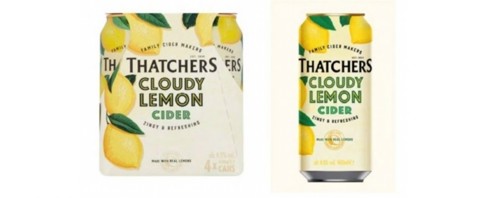This is a case that has trundled through the courts over the last couple of years and Ashfords has kept abreast of these developments, having reported previously in our articles from September 2023, January 2024 and October 2024.
Aldi won the case at first instance, however, this decision has now been overturned by the Court of Appeal, which we explore in this article.
Thatchers is a well-known British manufacturer of cider, particularly well-known down here in the South West!
Since February 2020, Thatchers has sold, in the UK, a cloudy lemon cider with the following packaging design:

Since 2013, Aldi has sold its ‘Taurus’ brand cider. In 2022 Aldi introduced a cloudy lemon cider which Thatchers claim infringe on it’s trade mark rights:

|
The case was heard in the Intellectual Property Enterprise Court (IPEC) and was heard over two days by HHJ Melissa Clarke.
|
In the first instance, the court dismissed the claim which caused much debate amongst the legal community, finding that whilst there were similarities from a trade mark perspective, the similarities were not strong and the Thatchers packaging was made up of generic elements such as the use of lemons to describe lemon cider. Therefore the judge found that no confusion had occurred.
The judge held that the Aldi product could bring the Thatchers product to mind, however, for infringement to occur, there had to be some unfair advantage/detriment caused to the Thatchers brand, which didn’t occur.
The parties agreed that if there was no confusion then the passing off claim could not be successful.
Thatchers appealed solely on the judge’s decision regarding s.10(3) of the Trade Mark Act 1994. For context, s.10(3) of the act states the following:
(3) A person infringes a registered trade mark if he uses in the course of trade a sign which - (a) is identical with or similar to the trade mark, (b) where the trade mark has a reputation in the United Kingdom and the use of the sign, being without due cause, takes unfair advantage of, or is detrimental to, the distinctive character or the repute of the trade mark.
|
In his leading judgment, Lord Arnold concluded the following:
|
Aldi raised a defence under s.11(2)(b) of the Trade Marks Act, arguing that the features of its Taurus packaging which is used were the descriptive/non-distinctive elements of the Thatchers’ mark. Lord Justice Arnold dismissed this argument, stating “it is illegitimate to dissect the Sign into its consistent elements for the purposes of applying section 11(2)(b) and to argue that, because some of those elements are descriptive, the Sign as a whole falls within section 11(2)(b)”.
This judgment has garnered a lot of attention in the legal world and has been celebrated by brand owners who pour money into their brands, only for discount retailers to seemingly ‘copy’ it.
It is clear that registering the packaging as a trade mark was the correct move by Thatchers. Without this, Thatchers would not have had a claim against Aldi. Brand owners should take note that including non-distinctive elements, such as lemons on the packaging, may raise issues surrounding how distinctive a mark is and companies should steer clear of this. The more distinctive the packaging/trade mark, the stronger the mark’s rights will be.
If brand owners should take anything away from this judgment, it is that evidence is key in proving infringement. Thatchers were able to argue their case as they had evidence that consumers and journalists were linking the two products in their mind, via articles and social media comments. Whilst there is current debate in the legal community of whether the court will accept survey evidence, such evidence is free to gather and could be crucial in a case such as this.
It is understood that Aldi are considering appealing to the Supreme Court so there may be a part five to this saga…
For more information please contact Clare Jackman.
We produce a range of insights and publications to help keep our clients up-to-date with legal and sector developments.
Sign up